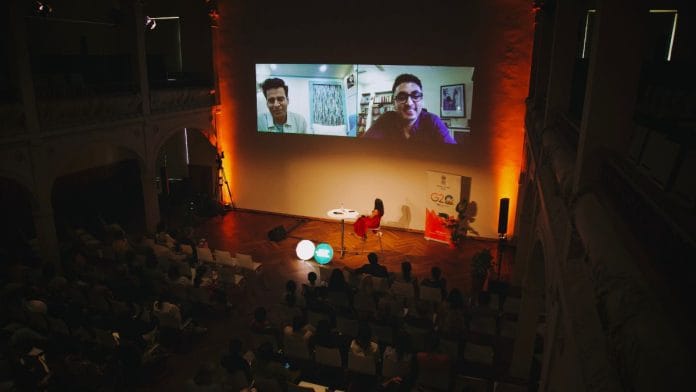New Delhi: The biggest non-commercial Indian film festival to ever be held outside the country will take place in Germany from 10-12 January 2025. Indian Film Festival Germany is a joint venture of the Embassy of India, Berlin & The Tagore Centre. The very first edition of the festival will feature more than 40 screenings, exclusive premieres, Q&A sessions, along with a star-studded opening gala in Berlin and simultaneous screenings and panel discussions in Hamburg, Frankfurt, and Munich.
“Indian cinema has evolved into a global phenomenon, captivating audiences far beyond its borders. Our rich cinematic tradition is a reflection of our vibrant culture and a universal medium for connecting hearts and minds. IFF Germany brings this spirit to one of the world’s premier film hubs, fostering deeper cultural and economic ties between India and Germany,” said Ajit Gupte, Ambassador of India to Germany.
Boman Irani’s directorial debut The Mehta Boys is the official opening film of the festival. Other headliner films include National-Award winning Gulmohar, Manoj Bajpayee-starrer Despatch.
The screenings will be held at state-of-the-art venues, including CinemaxX’s Potsdamer Platz cinema, the main venue for premieres held at Berlin’s international film festivals. The Indian viewing experience will be complete with samosa, which is on offer as a theatre snack.
“The lineup we’ve curated represents the best of Indian cinema today—bold, diverse, and deeply human, with many directors and actors already celebrated on international platforms like Cannes, Toronto, and the Academy Awards,” said Trisha Sakhlecha, director, The Tagore Centre.
The festival will also screen India’s official entry to the 2025 Oscars, Kiran Rao’s Laapataa Ladies, and a special screening of Shekhar Kapur’s Masoom (1983). Both screenings will be followed by Q&A sessions with the filmmakers.
Also read: Small-town India gets a new movie experience. Inflatable cinema halls with Dolby, recliners
An untapped market
The Tagore Centre has completed 30 years of showcasing the cultural heritage of India in Germany. It was inaugurated by PV Narasimha Rao on 5 February 1994, with a mandate to foster and strengthen cultural relations between India and Germany.
“This film festival aims to show how diverse Indian cinema is, and it is not just Bollywood. So we have movies from different regions and even short films. Since the Ministry of Information & Broadcasting and Indian Council for Cultural Relations is funding it, it is accessible for everyone,” said Sakhlecha to ThePrint.
There is also a clear industry focus with networking events and presentations.
Germany is a big market for Indian cinema, especially Bollywood. Shah Rukh Khan’s Jawan and Pathaan did extremely well at the box office in the country, earning €690K and €950K respectively. Jawan was also the first Indian film to be shown on the world’s largest IMAX screen, which is in Germany.
Khan, who was in the country for the shoot of Don 2, was surprised by the crowd that had gathered to wish him on his birthday. It was a larger crowd than Brad Pitt gets, according to those who were present. And this popularity is not just restricted to Indian fans.
At the Namaste Berlin Festival hosted by the Embassy of India, Berlin & the Tagore Centre in collaboration with Kultursommer last year, 7000 people attended, with queues at the gate stretching for almost 2.5 hours due to high demand. Almost seventy per cent of the audience was German, said Sakhlecha.
The festival held screenings of the Manoj Bajpayee and Sharmila Tagore-starrer Gulmohar, and Kartik Aryan’s Satyaprem Ki Katha.
“Bajpayee and I were unable to attend the festival in person. But there was a lot of enthusiasm for the discussion post-screening, and I was told that the queue outside was 1 km long, and most were Germans,” said Rahul V Chittella, director of Gulmohar.
“The Ministry of Information and Broadcasting is doing great things with great incentives and schemes to increase co-productions,” said Sakhlecha. Demon Hunter, releasing next year, has been co-produced with a Taiwanese production house. Payal Kapadia’s All We Imagine As Light, is an Indo-French co-production.
Sakhlecha pointed out how Germany is still an untapped market and how the festival could change that.
“Germany has always loved Indian cinema, since Satyajit Ray. Films are a great way of furthering our soft power,” she said.
(Edited by Theres Sudeep)






